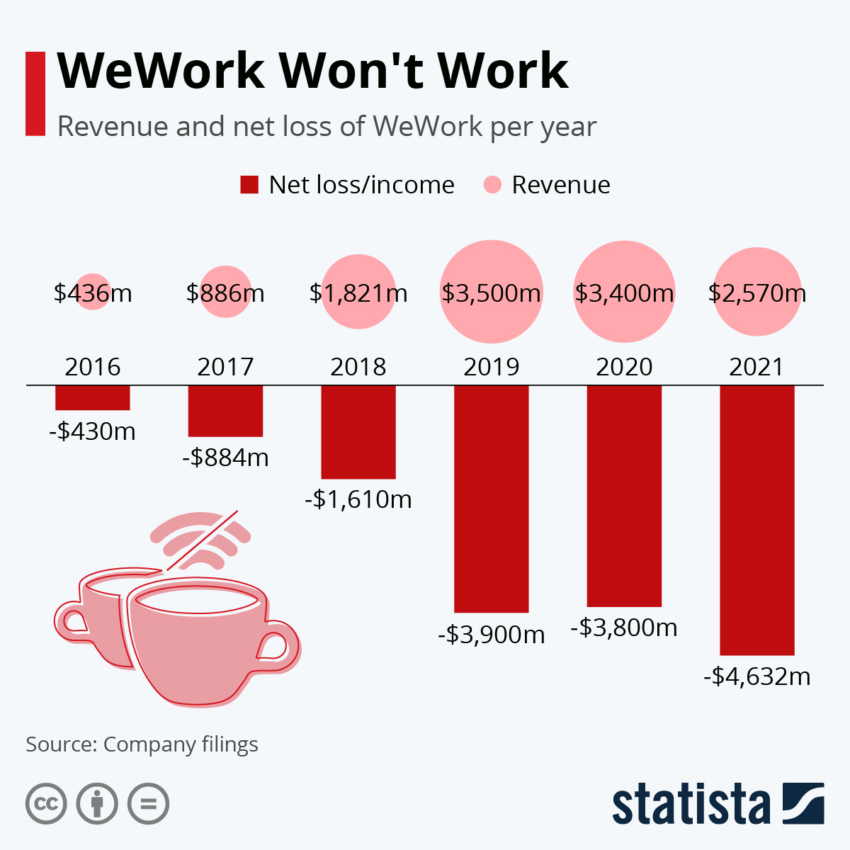The once-unstoppable WeWork has found itself on shaky grounds.
The co-working giant struggles to maintain its stronghold in the market. Hence, leaving crypto nomads prowling for workspaces that cater to their unique needs.
WeWork Is In Trouble
At its peak, WeWork was heralded as a visionary in shared office spaces. Under the leadership of Adam Neumann, its co-founder and then CEO, the company aimed to redefine traditional workspace environments.
It infused a sense of community through stylish designs and enticing perks that crypto nomads loved, like beer and kombucha on tap.
However, WeWork’s ambitious global expansion took a toll on the company’s finances. While it spent billions on leases and renovations worldwide, the incoming revenue could not keep up with the rent bills.
“As of June 30, 2023, WeWork’s consolidated real estate portfolio consisted of 610 locations across 33 countries, which supported approximately 715,000 workstations and 512,000 physical memberships, equating to physical occupancy of 72%, and a decrease in physical memberships of 3% year-over-year,” reads the quarterly report.

David Tolley, now at the helm as the interim chief executive, was quick to underscore that “macroeconomic volatility drove higher member churn and softer demand than we anticipated.”
Moreover, a glut of office spaces in the market combined with intensified competition from other co-working ventures poses significant threats.
“As a result of the company’s losses and projected cash needs, combined with increased member churn and current liquidity levels, substantial doubt exists about the company’s ability to continue as a going concern,” reads the report.
So, for WeWork, the road to recovery involves trimming lease expenses, boosting revenues, and possibly raising “additional capital via issuance of debt or equity securities or asset sales.”

The implications of WeWork potentially defaulting on its lease payments cannot be overstated. Indeed, such an event could exacerbate the existing downturn in the office space market. Subsequently leaving crypto nomads worldwide without their beloved co-working space.
Read more: Web3 Jobs: How to Get a Job in Crypto Sector
Alternatives to WeWork
In the shadow of WeWork’s decline, several alternatives have emerged for crypto enthusiasts enjoying their workcation.
Here are the top 7 WeWork alternatives and competitors:
- Regus has a vast global network, offering consistent, professional workspaces in numerous cities worldwide.
- Workbar’s standout feature is its “neighborhood” design, which offers different work environments to suit varying workstyles and tasks.
- Impact Hub is unique for its mission-driven approach, which intertwines co-working with social and environmental impact initiatives.
- Hera Hub sets itself apart as a spa-inspired, female-focused co-working space emphasizing community and collaboration among women entrepreneurs.
- TeamWorking by TechNexus is distinguished by its emphasis on tech innovation, facilitating partnerships between startups and established enterprises.
- Wolfhouse offers teams co-working retreats, blending work with team-building experiences in picturesque locations.
- Huddle Workspace is dedicated to fostering close-knit professional communities, encouraging deeper networking and collaboration.
Read more: Top 13 Highest Paying Web3 Jobs
But these are not all. As crypto nomads demand flexibility and an environment that fosters productivity, other alternatives are emerging as the go-to choices:
- Local cafes as traditional as it sounds, remain a haven for remote workers. For instance, the United Kingdom sees chains like Pret and Leon offering enticing monthly drink subscriptions, making them cost-effective workplaces.
- Libraries, often overlooked, serve as a quiet, free alternative to bustling cafes. They provide essential amenities like free Wi-Fi and, in some cases, dedicated desks and study rooms. Furthermore, institutions like university libraries and even some museums provide space for focused work.
- Museums and galleries have embraced the co-working trend. Members often benefit from private rooms, free Wi-Fi, and a serene environment infused with culture.
- Hotels have repurposed their rooms into workspaces. Indeed, chains like Hilton and Marriott offer day-use rates for those seeking a change from their usual workspace.
- Pubs and restaurants have gained momentum. Indeed, this option offers a blend of work and leisure, ensuring that burnout remains at bay.
With WeWork navigating financial turbulence, crypto nomads are feeling the pressure. However, adversity often sparks innovation. From Regus to pubs and restaurants, crypto nomads are adapting.
Disclaimer
Following the Trust Project guidelines, this feature article presents opinions and perspectives from industry experts or individuals. BeInCrypto is dedicated to transparent reporting, but the views expressed in this article do not necessarily reflect those of BeInCrypto or its staff. Readers should verify information independently and consult with a professional before making decisions based on this content. Please note that our Terms and Conditions, Privacy Policy, and Disclaimers have been updated.


